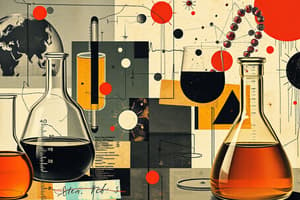Podcast
Questions and Answers
What is matter?
What is matter?
Anything that has mass and occupies space.
What is chemistry?
What is chemistry?
The study of the composition of matter and the changes that matter undergoes.
What is organic chemistry?
What is organic chemistry?
The study of all chemicals containing carbon.
What is inorganic chemistry?
What is inorganic chemistry?
What is biochemistry?
What is biochemistry?
What is analytical chemistry?
What is analytical chemistry?
What is physical chemistry?
What is physical chemistry?
What is pure chemistry?
What is pure chemistry?
What is applied chemistry?
What is applied chemistry?
What is technology in the context of chemistry?
What is technology in the context of chemistry?
What does microscopic mean?
What does microscopic mean?
What is biotechnology?
What is biotechnology?
What is a pollutant?
What is a pollutant?
What is the scientific method?
What is the scientific method?
What is an observation?
What is an observation?
What is a hypothesis?
What is a hypothesis?
What is an experiment?
What is an experiment?
What is a manipulated variable?
What is a manipulated variable?
What is a responding variable?
What is a responding variable?
What is a theory?
What is a theory?
What is a scientific law?
What is a scientific law?
What is a numerical word problem?
What is a numerical word problem?
What is a conceptual word problem?
What is a conceptual word problem?
What is the macroscopic world?
What is the macroscopic world?
Flashcards are hidden until you start studying
Study Notes
Matter and Chemistry Fundamentals
- Matter: Anything that possesses mass and occupies space.
- Chemistry: The exploration of matter's composition and the transformations it undergoes.
Branches of Chemistry
- Organic Chemistry: Focuses on carbon-containing compounds.
- Inorganic Chemistry: Studies substances generally devoid of carbon.
- Biochemistry: Investigates biological processes within organisms.
- Analytical Chemistry: Concentrates on determining matter's composition.
- Physical Chemistry: Examines mechanisms, rates, and energy transfers during chemical changes.
Types of Chemistry Pursuits
- Pure Chemistry: Engages in the pursuit of chemical knowledge for intellectual curiosity.
- Applied Chemistry: Involves practical research aimed at specific applications.
Technology and Society
- Technology: Encompasses the tools and methods societies develop to meet needs and desires.
Observational Concepts
- Microscopic: Describes objects that require magnification to be visible.
- Pollutant: Refers to harmful materials present in air, water, or soil affecting organisms.
Scientific Inquiry
- Scientific Method: Systematic approach for addressing scientific problems.
- Observation: Utilization of senses to gather information.
- Hypothesis: A tentative explanation formulated based on observations.
- Experiment: A structured process to test a hypothesis.
Variables in Experiments
- Manipulated Variable (Independent Variable): The variable intentionally altered in an experiment.
- Responding Variable (Dependent Variable): The variable measured to assess changes influenced by the manipulated variable.
Theories and Laws
- Theory: A robust and tested explanation covering a wide range of observations.
- Scientific Law: A succinct statement summarizing the outcomes of numerous observations and experiments.
Problem-Solving in Chemistry
- Numerical Word Problem: Involves the process of analyzing, calculating, and evaluating.
- Conceptual Word Problem: Entails analysis and resolution of scientific concepts.
Perspectives on Scale
- Macroscopic World: Describes large objects that can be viewed without magnification.
Studying That Suits You
Use AI to generate personalized quizzes and flashcards to suit your learning preferences.




